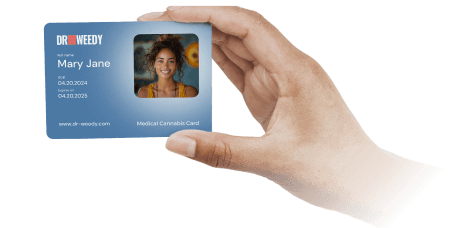Illinois medical marijuana card FAQ
The documents needed for a medical marijuana card application in Illinois include a Health Care Provider Certification, passport-style photo, proof of Illinois residency, a government-issued ID and proof of payment of the state application fee. When applying with a caregiver, the caregiver provides a proof of identity, caregiver attestation form, and proof of payment of the fee.
Patients who are unable to take care of themselves and responsibly use medical cannabis, and patients under 18 who qualify for a medical marijuana card, can designate up to three caregivers in Illinois.
Medical marijuana records in Illinois are private under the HIPAA Act and the Compassionate Use of Medical Cannabis Program Act. The records are confidential and exempt from the Freedom of Information Act, so employers don’t have access to medical marijuana information. Only law enforcement agencies can access them when investigating a marijuana-related crime.
A licensed physician in Illinois who has a controlled substance license under Article III of the Illinois Controlled Substance Act, is in a good standing with the state, and has an authentic doctor-patient relationship with the patient, can prescribe marijuana. The physician can be a doctor of medicine or osteopathy, Physician Assistant, an Advanced Practice Nurse or an Advanced Practice Registered Nurse-Full Practice Authority.
Insurance does not cover medical marijuana in Illinois. Contact your insurance provider for more information.
You can buy medical marijuana at Illinois medical marijuana dispensaries across Illinois. Those without a medical marijuana card can visit a recreational or a dual-use dispensary. To find a dispensary near you, visit https://cannabis.illinois.gov/about/locations.html
When visiting a medical cannabis dispensary, you must have your medical marijuana card with you. At dual-use dispensaries, adults with a valid ID card can purchase a limited amount of cannabis.
To apply for a medical marijuana card in Illinois, you first need to obtain a Health Care Provider Certification. Dr. Weedy offers an online evaluation for this certification at a cost of $99, with a guaranteed refund in case of denial.
Once you have your certification, the application fee for a medical marijuana card in Illinois is $50 for a one-year card, $100 for a two-year card and $125 for a three year card. Veterans and patients enrolled under the Supplemental Security Income and Social Security Disability Income get discounted marijuana fees.
To register with the Illinois medical marijuana program, you should obtain a medical cannabis certification from a licensed physician. Then, create an account with the Illinois Cannabis Tracking System and submit your passport photograph, proof of Illinois residency and government-issued ID. Wait for approval within 30 business days.
It takes 30 business days for the Illinois Department of Health to review applications. Once approved, the department issues the medical marijuana card in 15 days.
Yes, you need to provide a proof of Illinois residency before receiving a medical marijuana card. Caregivers must also provide a proof of residency in the State of Illinois.
Yes, the Illinois medical marijuana program allows you to apply for the medical card online. The Illinois medical marijuana program provides a convenient online application process. Once your application is approved, you can access your card or provisional letter through the Illinois Cannabis Tracking System. For instructions on how to print your card or provisional letter, please visit the following link: https://dph.illinois.gov/topics-services/prevention-wellness/medical-cannabis/print-card-provisional-letter.html.
Patients under 18 can get a medical marijuana card with the consent of a biological parent or legal guardian, who will serve as their designated caregiver, as long as they have been diagnosed with the qualifying medical conditions. To qualify, minors must get two certifications from two different healthcare providers. The first certification confirms the minor's eligibility for the medical marijuana treatment, and the second serves as a review of the initial certification. Minors apply for medical cards via their caregiver, which must be a legal guardian or custodial parent.
There are two types of renewals for medical marijuana cards in Illinois:
- Extension renewal: If you initially applied for a one-year or two-year card, you can renew without needing a new Health Care Professional Certification. You’ll receive an email reminder about your extension renewal 45 days before the card expires. Simply log into the Illinois Cannabis Tracking System to submit your application and pay the renewal fee.
- Full recertification renewal: If you’ve had your card for three years or if it has expired, you'll need to visit your healthcare provider for a new Health Care Professional Certification. You’ll also need to submit a new application with updated documents and pay the renewal fee. IDPH will notify you via email five months before your card expires to begin the renewal process.
An extension renewal is for patients with one- or two-year cards who want to extend their card annually (but not more than 3 years in a row). No new healthcare certification is needed for this type of renewal. A full recertification renewal is required for patients with a three-year card or expired card and involves obtaining a new Health Care Professional Certification and submitting updated documents.
It usually takes up to 10 business days for your extension renewal application to be approved and up to 30 business days for the full recertification renewal process to be completed. It’s best to start the renewal process around 45 days before the expiration date.
The validity period depends on the type of medical marijuana card you applied for. Illinois offers one-year, two-years or three-years cards. After three years, a full recertification renewal is required.
The Illinois Department of Public Health (IDPH) sends email reminders based on the type of renewal:
- For extension renewals (one- or two-year cards), you’ll receive an email approximately 45 days before your card expires.
- For full recertification renewals (three-year cards), you’ll be notified five months before your card’s expiration date.
If you miss the renewal deadline and your card expires, you’ll need to undergo the full recertification process, including getting a new Health Care Provider Certification and submitting updated documents. Avoid delays by submitting your renewal application before the expiration date.
Yes, during the full recertification process, you can choose to apply for a three-year card instead of renewing annually. This will require a new Health Care Provider Certification and other updated documents.
If you have a 6-month Terminal Illness Registry Card, you will need to submit a new qualifying patient application instead of starting a new Terminal Illness application. For specific instructions, you can contact a Terminal Illness Specialist at 855-636-3688 or email dph.terminalill@illinois.gov.
Yes, if you wish for your designated caregiver(s) to continue assisting you, their registry card must be extended or renewed at the same time as yours. For instructions on how to cancel or add a caregiver during the renewal process, visit https://dph.illinois.gov/topics-services/prevention-wellness/medical-cannabis/patient-extension.html.
Weed is legal in Illinois for medical and recreational use. Patients who qualify can receive a medical marijuana card and consume medical cannabis. Adults who are 21 years and older can purchase marijuana with their valid ID card.
Medical marijuana patients can grow up to 5 cannabis plants no more than 5 inches tall in their home. The marijuana plant must be locked and invisible to the public.
However, recreational users are not permitted to grow cannabis for personal use. Only registered medical cannabis patients are legally allowed to cultivate plants in their residence.
In Illinois, both medical and recreational cannabis are subject to taxes, but the rates differ significantly. Medical cannabis is taxed at a reduced rate similar to other qualifying drugs. Medical marijuana patients typically pay a sales tax of between 1% and 3% depending on the municipality.
Recreational cannabis, however, is taxed at much higher rates. The state imposes a 10% excise tax on cannabis with a THC level at or below 35%, a 20% excise tax on all cannabis-infused products, and a 25% excise tax on cannabis with a THC level above 35%. Additionally, these excise taxes are on top of the standard 6.25% state sales tax and local taxes, which can be up to 3.5%. Depending on the product's THC content and local tax rates, the total tax at the register can range from approximately 19.55% to 34.75%.
When purchasing at a medical dispensary, you need a medical card to buy cannabis. But at dual-use or recreational dispensaries, you can purchase cannabis with a government issued ID.
Medical marijuana patients in Illinois lose their gun rights under the Gun Control Act of 1968. They are not allowed to purchase or possess guns.
Employers are not allowed to discriminate against medical marijuana patients solely because of the fact that they consume medical marijuana. But, this does not apply to federal workers in Illinois. Under the Illinois Human Rights Act, patients who consume legal cannabis are protected from discrimination, including provisions for reasonable workplace accommodations. For instance, being discriminated against at work due to cannabis use. Keep in mind that employers still have the right to set their rules on cannabis use in the office.
Public consumption of medical marijuana is not allowed in Illinois, even if you have an MMJ card. The public includes streets, parks, even areas close to licensed dispensaries, and any place where others can reasonably observe you. Medical cannabis use is also banned in school buses, on school grounds (preschools, primary, and secondary schools), in correctional facilities, in vehicles, in private residences that provide licensed child care or social services, and in health care facilities. Additionally, it’s not allowed in places covered by the Smoke-Free Illinois Act or near individuals under the age of 18.
If stopped by law enforcement, it may be appropriate to inform them that you are a registered participant in the Compassionate Use of Medical Cannabis Program and show your registry identification card. However, since cannabis remains a Schedule I controlled substance under federal law, participation in Illinois' medical cannabis program may not protect you from federal legal consequences. It’s recommended that you consult with your private attorney to discuss your rights and legal protections.
No, medical cannabis registry cards issued by other states are not valid in Illinois. Only cards issued through the Illinois Department of Public Health Division of Medical Cannabis can be used to purchase medical marijuana within the state.
Get your medical marijuana card
Plant your health with Dr. Weedy. Get all the benefits of a medical card at a low price for a year





























